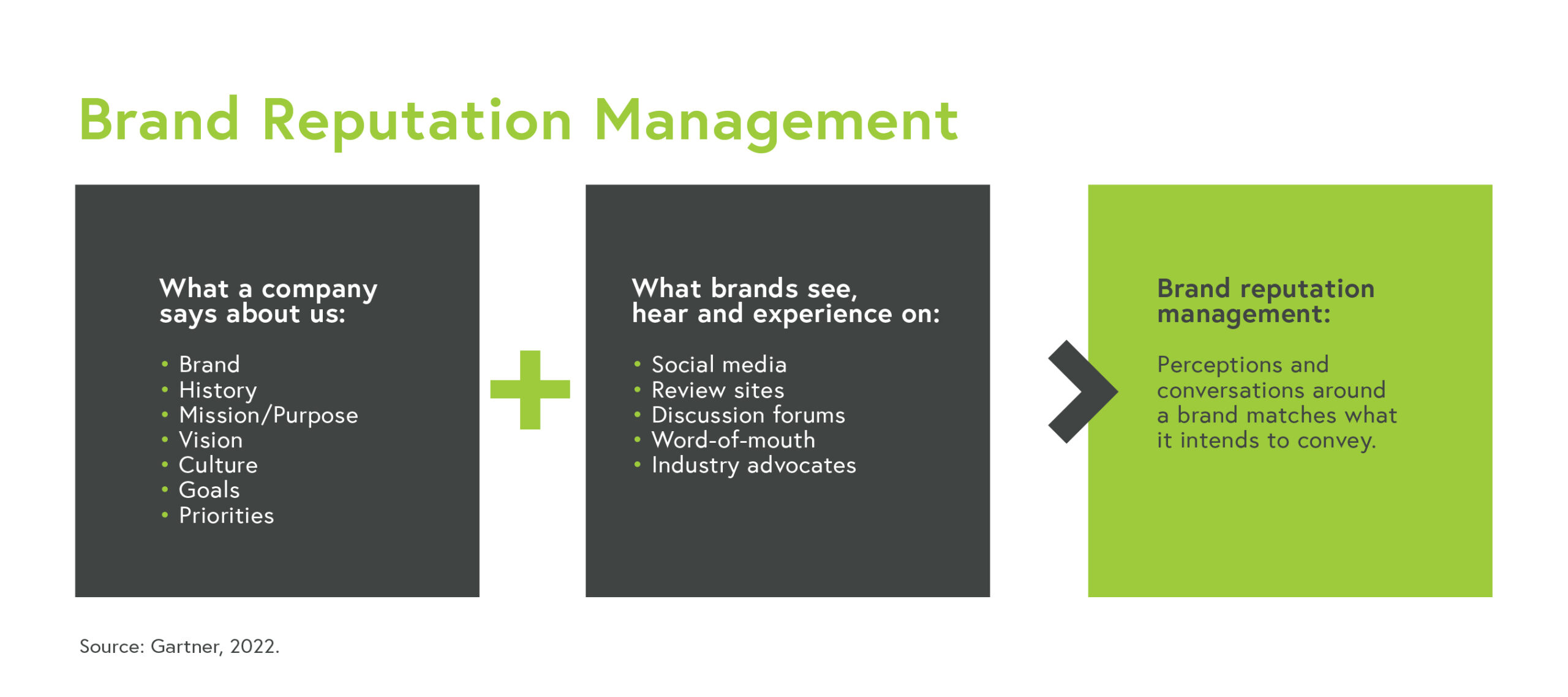A brand takes years to build but could take five minutes to destroy. Practicing sustainability and social responsibility can help your brand reputation in the long run.
Your brand reputation is everything. When aligned with your purpose, a good reputation builds strong customer bases. When customers choose between brands, their reputation and what it stands for can make or break that decision. A report from the World Economic Forum states that a quarter of a company’s market value can be directly related to its reputation. In addition, 87% of executives believe that the challenges of building a reputation are more crucial than other strategic risks.
With online Google Reviews, Facebook comments, posts, ratings, and other forms of social media, people are changing how they consume information and advertising. Gone are the days when people solely believed in traditional ads such as commercials or even simple social media posts. Instead, people want to find more authentic, honest, reliable brands that match their morals in a world where word of mouth rules. They’re also looking for brands whose perspectives on climate initiatives, worker conditions, and political stances align with theirs.
The Harvard Business School states, “Consumers are more inclined to support companies that invest in Corporate Social Responsibility (CSR). Research shows 77% of shoppers are motivated to buy from businesses that are committed to making the world a better place, and 55% believe companies should take a stand on key environmental, political, and social issues.”

Managing your company’s reputation is critical for business success. You will need to be creative, on top of trends, mindful, and adopt sustainability and social responsibility practices to set yourself aside from others.
Environmental Responsibility
People care about the planet, the environment, society, and the future. This year, companies should adopt ESG and DEI to get more support from most of their stakeholders. ESG, or environmental, social, and Governance, refers to non-financial factors investors can consider to identify risks and growth opportunities. DEI, conversely, relates to diversity, equity, and inclusion in the workplace as a way to create more innovation, better decision-making, and outperform the competition.
Stakeholders want to see real action, and failure to do so might result in loss of profit, economic recession, and consideration for long-term societal/environmental impacts. Additionally, environmental responsibility comprises not only your environmental impact but also your risk management practices. For example, are you directly or indirectly involved in greenhouse gas emissions and natural resources, or are you resilient against various risks?
Social Responsibility
Today, consumers are more aware of the potential harm certain practices bring to the environment, society, and human rights. People want to see companies take accountability for their actions, including correcting behaviors, compensating, and cultivating good operating practices. Corporate social responsibility can reduce damage to your reputation and negatively impact your community.
Social responsibility can come in many different forms, such as:
- Economic: Backing financial decisions and maximizing profits while being conscious of the environment, people, and the planet.
- Environmental: This type of responsibility and environmentally friendly behavior reduces waste, increasing renewable energy and offsetting impact.
- Ethical: Operating ethically and fairly with excellent treatment of workers, customers, investors, and other stakeholders.
- Philanthropy: Investing strategically in altruism can improve conditions for stakeholders in your community.
- Education: Many brands are investing in community education in their overall CSR strategy.
Governance
Governance refers to how your company/business operates. How is it directed, managed, and accountable for its actions? You should align with your stakeholders’ expectations and respect and honor everyone involved—including your company leaders. Promoting transparency and accountability will create a more meaningful and productive relationship between your stakeholders, team, and consumers.
“Organizations are continuing to invest in and prioritize ESG. Most respondents say their company has either increased its focus (46%) on ESG this year, or its focus will stay the same (41%). In addition, only 3% of respondents report plans to decrease spending on ESG factors in 2022, an even smaller group than the 6% who reported plans to decrease ESG spending in 2021.” stated BusinessWire.
Embracing ESG can be a powerful tool for connecting your business with consumers, investors, and other stakeholders. Today, it is no longer an option but is expected by stakeholders. Communications and public relations are the pulse of your brand’s message and require a well-thought-out strategy and execution plan. Our licensed Comms Advisor works with your business to design and manage engaging and meaningful internal and external communications to reach your target audiences by helping you answer questions such as ‘who am I speaking to and why?’ We do this by implementing real-time research, smart data, analytics, and up-to-date consumer and market trends to your overall brand and reputation management strategies—two areas of our expertise. Contact us to learn more about what we can do for your comms strategies for optimal business growth!
ABOUT US
DuartePino is a management outsourcing firm that combines in-depth customer knowledge with practical expertise in marketing, communications, brand management, and overall business strategies to help clients create sustainable business growth. Our single-source accountability comprises a unified network of Trusted Advisors with years of combined experience in their respective industries. As a result, we can provide your organization with a fresh perspective, proven processes that invest in results, and the martech tools for successful execution.
We have one primary purpose: to help Hispanic-led companies connect with growth opportunities. We do this by intentionally building relationships of trust, internally and externally, through reliability, competence, and integrity. As members of the Worldcom network, we also have quick and unfettered access to the resources of more than 80 global partners in 50 countries and six continents to work together in designing and implementing communications strategies for all key stakeholders. Today, we proudly manage over 15 marketing communications departments representing more than $1B in annual sales, and 70% are exporting to international markets.

